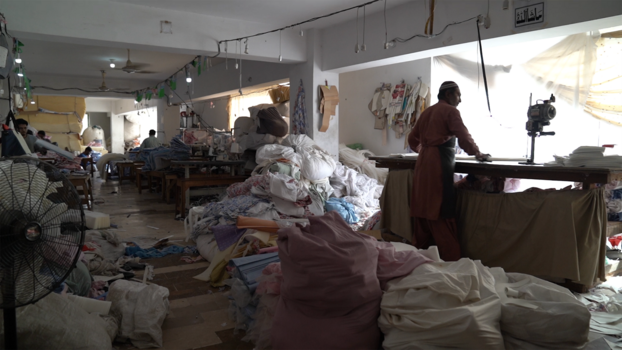
Most workers in Pakistani garment factories are cheated out of their rightful wages. The vast majority do not receive written contracts, pay slips, or wages that would enable them to feed their families. Moreover, factories in Pakistan often hire only a small proportion of the workers directly. Many workers are hired through third parties who act as intermediaries between the textile factories and the workers. Often, these workers do not even receive the nominally legal minimum wage and are not registered and insured in the social security system.
This so-called contracting system is a way to flexibly get rid of workers if necessary and makes it difficult to trace labour rights violations and the affiliation of workers to factories. These practices are well known to anyone working in the Pakistani garment industry, including brands and retailers who produce in Pakistan. Nevertheless, companies have ignored these obvious labour rights violations for decades.
There is a growing worldwide movement to legally require companies to respect human rights. As one of the first of its kind, the German mandatory human rights due diligence law entered into force on 1 January 2023. This law requires companies to protect the human rights of workers in their supply chains. Among these rights is the payment of an adequate wage, i.e. at least the national minimum wage of the respective country.
To assess how companies covered by the new German law implement their new due diligence obligations, a survey was conducted among workers in Pakistan who produce for such brands and retailers. For this, more than 350 garment workers in different factories in Sindh province were interviewed over a period of six months between January and June 2023. The results of the study indicate that, so far, brands and retailers have undertaken no effective measures to prevent the withholding of an adequate (living) wage in the surveyed factories.
Of the over 350 workers interviewed, 97 percent of respondents did not have a written employment contract, and 80 percent did not even receive a pay slip. Twenty-nine percent of workers reported being employed through third parties. In the factories where employment through third parties was reported particularly frequently, this was also accompanied by particularly serious violations of labour law, including withholding of appropriate wages: approximately 28 percent of workers did not even nominally receive the legal minimum wage for “unskilled workers” of 25,000 Pakistani rupees per month. In 94 percent of these cases, no trade union was active and 84 percent of those not receiving the legal minimum wage were either employed through third parties or received piecework wages.
Even among the workers who reported receiving the minimum wage for unskilled workers of 25,000 Pakistani rupees per month, 49 percent did not receive overtime pay. This indicates that in practice they did not receive the minimum wage in relation to the number of hours worked. Many more of them stated that they had received skills training or were working in positions that qualified them as “semi-skilled”, “skilled”, or even “highly skilled” workers, which would entitle them to a higher minimum wage than 25,000 rupees under Pakistani labour law. Even based on very conservative calculations of the local living wage in Karachi, only a fraction, if any, of workers received such a wage.
The study No Contracts, No Rights sponsored by the Rosa Luxemburg Foundation provides a revealing insight into employment practices and working conditions in Pakistan’s textile industry. The results of this survey confirm the severity of issues that have been known about the Pakistani textile industry for years while also showing that so far, brands and retailers have not acted upon the well-known violations that rights holders are facing.